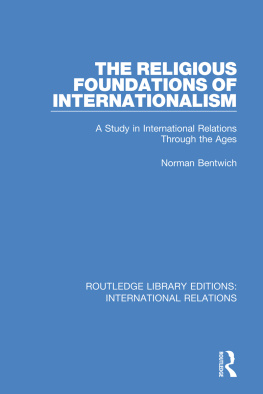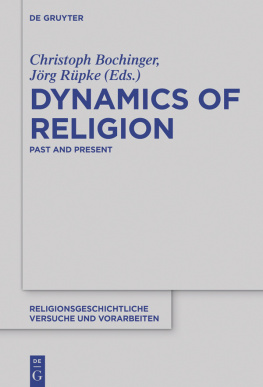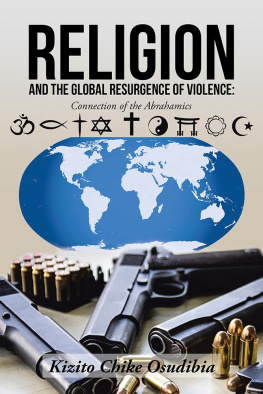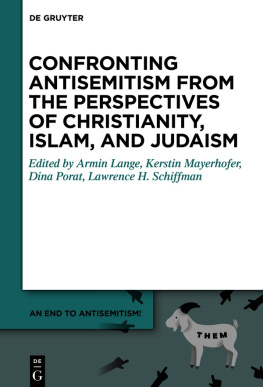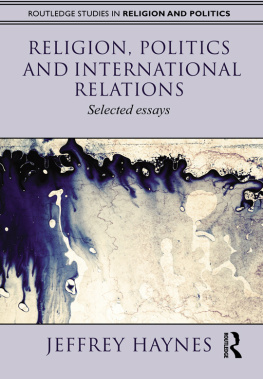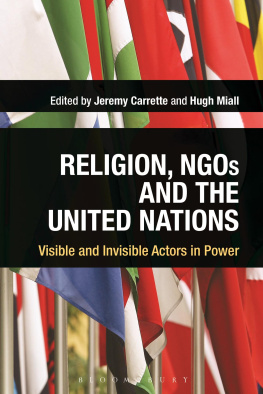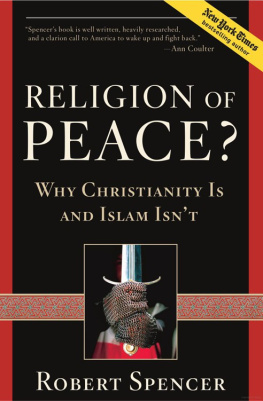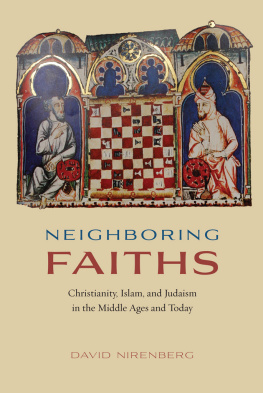ROUTLEDGE LIBRARY EDITIONS:
INTERNATIONAL RELATIONS
Volume 1
THE RELIGIOUS FOUNDATIONS OF
INTERNATIONALISM
The Religious Foundations of Internationalism
A Study in International Relations Through the Ages
Norman Bentwich
First published in 1933 by George Allen & Unwin Ltd.
Second Edition with additional chapter 1959
This edition first published in 2016
by Routledge
2 Park Square, Milton Park, Abingdon, Oxon OX14 4RN
and by Routledge
711 Third Avenue, New York, NY 10017
Routledge is an imprint of the Taylor & Francis Group, an informa business
1959 George Allen & Unwin Ltd.
All rights reserved. No part of this book may be reprinted or reproduced or utilised in any form or by any electronic, mechanical, or other means, now known or hereafter invented, including photocopying and recording, or in any information storage or retrieval system, without permission in writing from the publishers.
Trademark notice : Product or corporate names may be trademarks or registered trademarks, and are used only for identification and explanation without intent to infringe.
British Library Cataloguing in Publication Data
A catalogue record for this book is available from the British Library
ISBN: 978-1-138-94006-2 (Set)
ISBN: 978-1-315-66794-2 (Set) (ebk)
ISBN: 978-1-138-94593-7 (Volume 1) (hbk)
ISBN: 978-1-315-67107-9 (Volume 1) (ebk)
Publishers Note
The publisher has gone to great lengths to ensure the quality of this reprint but points out that some imperfections in the original copies may be apparent.
Disclaimer
The publisher has made every effort to trace copyright holders and would welcome correspondence from those they have been unable to trace.
THE RELIGIOUS FOUNDATIONS
OF INTERNATIONALISM
A STUDY
IN INTERNATIONAL RELATIONS
THROUGH THE AGES
by
NORMAN BENTIWICH
FIRST PUBLISHED IN 1933
Second Edition with additional chapter 1959
This book is copyright under the Berne Convention. Apart from any fair dealing for the purposes of private study, research, criticism or review, as permitted under the Copyright Act 1956 no portion may be reproduced by any process without written permission. Enquiries should be made to the publisher.
This Second Edition George Allen & Unwin Ltd., 1959
REPRINTED BY LITHOGRAPHY IN GREAT BRITAIN
BY JARROLD AND SONS LTD, NORWICH
Preface
THIS book contains, with some amplification, the course of lectures which I gave at Jerusalem in 1932 when the Weizmann Chair of the International Law of Peace in the Hebrew University was inaugurated. The course was given in Hebrew: and the Hebrew version will be published by the University Press. In the first lecture, which was designed both as an introduction to the Chair and a prelude to the course, I sought to show the place which Jerusalem has occupied in the movement for international peace, both in history and in idea. The main theme of the course was the influence of the different religions of the world on the furtherance of peace between nations and on the development of international relations and international law.
Of the man whose name is attached to the Chair, I would say here that I believe history will record him as one who not only piloted the Jewish vessel through an uncharted and often stormy sea for fifteen years with the greatest skill and with single-minded devotion, but as the man who brought fulfilment to the idea of the restoration of the temple of Hebraic culture to Jerusalem, and, by his enthusiasm and will, established a resting-place of the Jewish mind and the Jewish spirit which have wandered for nearly 2,000 years.
I adopted deliberately the historical approach to the subject, not only because that seemed appropriate to the inauguration of a Chair of the Law of Nations in the most historical city of the world, but also because I believe that it is apposite to our time. International law was regarded essentially by its early exponents, Grotius, Wolff, Vattel, etc., as a philosophy of history. Going farther back, the Hebrew prophets conceived the idea of universal peace as the conclusion of their philosophy of history. And that conception persisted to the middle of the last century. One of the Classics on the subject, Laurent's Histoire du Droit des Gens , published in 1861, has an alternative title, tudes sur l'Histoire de l'Humanit; and a large part of it deals with the teaching of the religions of the world. The author's professed aim was to follow the progress of mankind towards unity, which was the object of international law. He justified his theme against German scholars who attacked him for intruding theology in a work of international law. Leibnitz, he says, shall answer for him, the philosopher who declared: "Theologia species quaedam est Jurisprudentiae aeternim sumptae," and who included the decrees of the Councils of the Pope in his Corpus of International Law. Religion, as soon as it forms a Church, is a concern of the law of nations, since all ties which unite diverse peoples in a single association belong to the science of international relations, and there is no tie stronger than religion. Again, international law is the body of rules which govern nations considered as members of humanity, and religion throughout history is the strongest spiritual force which emphasizes that aspect of the nation. While Grotius and his Protestant successors regarded international law as a philosophy of history, a still earlier generation of Catholic Jesuit jurists had developed it as a branch of Christian ethics.
If we have moved far from the mediaeval idea that theology was the supreme science and law one of its instruments, yet the connection between law, theology, and ethics cannot be severed without loss, more particularly in those branches of legal science which are concerned with the relations between nations. Mr. Gladstone remarked on one occasion that no man can be a perfect lawyer who is not a theologian; and although his own theological predilections doubtless influenced him in that judgment, he was in a line of authority worthy of respect. The attempt to formulate international law as a system of legal propositions, without taking account of the spirit which should inform them, has led to the present spectacle of statesmen and jurists multiplying conventions for preserving the peace without the will to peace or the understanding of peace between the peoples. The sanction of the law of nations must be either war or morality; and nations to-day, who have in agreement foresworn war, have not yet established the ethical foundation of their mutual relations. Our society, as Professor Arnold Toynbee says, is being ruined by sin. One of the profound political troubles of our age is that, while modern science has multiplied human contacts, and almost destroyed the old isolations of time and space which severed nations, little progress has been made in bringing international relations under the control of the moral law. The world is politically as well as economically interdependent; what happens to-day between, e.g., China and Japan profoundly affects the peoples and the States of Europe and America. And so long as the relations between countries are not controlled by moral principles, and the nations do not hold faithfully to their solemn compacts, they threaten to ruin the peace of the world. The religions of the peoples, which alike uphold certain moral principles and share the common ideal of justice and peace, offer the best foundation for that universal moral law which must be established if civilization is to stand.

